Recently, there have been a bunch of adaptations of classic science fiction and fantasy books from previous decades. Frank Herbert’s Dune (1965), Octavia Butler’s Kindred (1979), Anne Rice’s Interview with the Vampire (1985) and Neil Gaiman’s Sandman (1989) were all formative books (and comics) I read as a young genre enthusiast and it’s fun to see a new generation of readers rediscover them through their respective shows.
It got me thinking about other books I read around the same time, books that are in conversation with fantasy being written today (including by me, something I’ve been considering as I finished writing The Prisoner’s Throne). Here are my top ten. Someone please adapt these immediately.
It’s worth noting that these books were written in a different time and even though some of them were progressive when they were published, they might not seem that way now. The Story Graph is a good resource for user-generated content warnings. Proceed at your own risk.
Catspaw by Joan D. Vinge (1988)
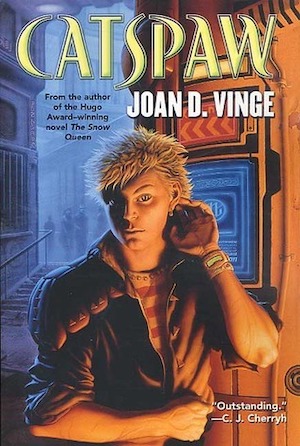
Cat, an orphan and telepath, gets dragged into a job he’s not so sure about, guarding a high-powered world leader who isn’t all that enthusiastic about him either. Soon Cat finds himself attempting to solve big important mysteries while fighting off boredom and having feelings about people. One of my early literary crushes – c’mon, he has cat eyes and his name is Cat and he sulks a lot and is part alien – I still remember this book with immense fondness. And despite all the reader pleasures Vinge made part of Cat’s character, the cyberpunk-esque world she built for him to move through is realistically awful and the outcomes are neither easy nor tidy. This is the middle book in a three book series, so there’s an argument for reading Psion first, but this is the one I remember best.
READ THIS IF: You love an outcast hero and/or have ever worn cat ears (even if it was just on Halloween).
Tales From the Flat Earth / Night’s Master by Tanith Lee (1978)
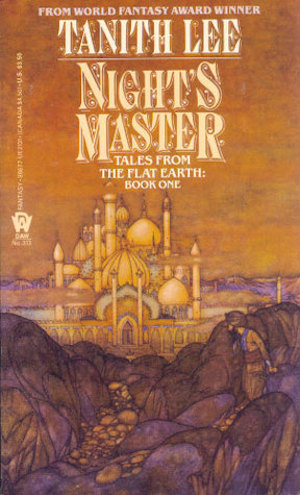
These are a little like someone wrote erotic, jewel-like version of Bible stories, but about demons and monstrous gods and terrible people. There are more books in this series (Death’s Master, Delusion’s Master, and Delirium’s Mistress – all concerning a different Lord of Darkness), but the first one focuses on the demon lord Azhrarn, called “Azhrarn the beautiful,” who is the absolutely worst and also canonically irresistible. Lee’s writing is gorgeously ornate and her stories are surprising, strange, and straddle the line between fantasy and horror. Exploring desire, wickedness, immortality, and immorality, this is an immersive, gothic master work. I cannot emphasize how hard I imprinted on these or how many times I read them.
READ THIS IF: You have a skull decoration anywhere in your house or if you love me – not my work, me, personally.
Swordspoint by Ellen Kushner (1987)
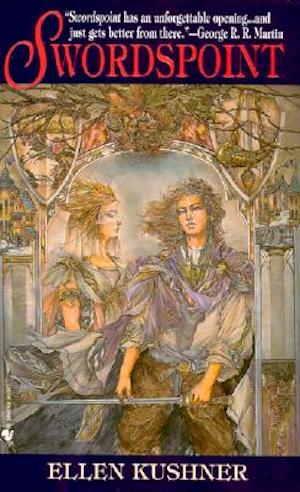
Richard St Vier is the finest swordsman-for-hire in a society where the elite use duels to settle disputes. He’s got a boyfriend, Alec, who spends his days drinking, gambling, and getting into potentially lethal trouble. Across town, on the Hill, Michael Godwin takes up the sword even though that’s not precisely a thing a young nobleman ought to do. When the three of them find themselves at the center of a political struggle and their secrets spill out, the moves that follow are genuinely surprising, moving, and delightfully clever. Called “a melodrama of manners,” this book adds swashbuckling to the novel of manners with a bit of courtroom drama to boot, but the charming dialogue and sharp writing is the reason I re-read it regularly. Only fantasy in the sense that this all takes place in a secondary world, Swordspoint remains a book that feels unlike any other.
READ THIS IF: You love clever dialogue, wished the characters in Downton Abbey would stab one another, or enjoy when a bad boyfriend has an even worse boyfriend.
Elric of Melniboné by Michael Moorcock (1972)
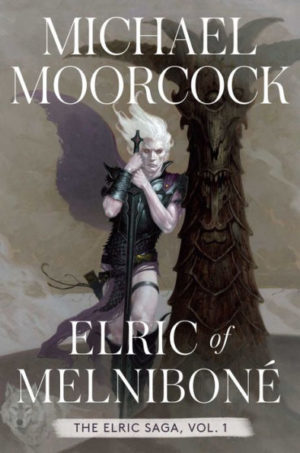
Elric is the sickly, bone-white, crimson-eyed last emperor of the Melnibonéans. They are a dwindling decadent and cruel race, separate from humanity, and seemingly without any empathy. They have stuff like a throne cut from a single ginormous ruby and musical entertainment made of people basically screaming. Elric is not into it, which puzzles his subjects and convinces his cousin Yyrkoon to plot to usurp him. But Elric has two things on his side – the sword, Stormbringer, which must be fed with souls, and Arioch, Lord of Chaos and Duke of Hell, to whom he pledges himself. Neither have his best interests at heart. What follows is a lot of adventuring, plenty of swords and sorcery, and aaaaaallllll the death. Moorcock wrote lyrics for Blue Öyster Cult and Hawkwind and has a deep dislike for Winnie the Pooh — that’s what you’re getting into here. This is also the book my husband gave me when we met in our teens and its aesthetic that has clearly influenced my idea of the decadence and cruelty in Faerie.
READ THIS IF: There’s a heavy-metal soundtrack playing in your head at all times or a voice telling you to kill everything you love.
Nifft the Lean by Michael Shea (1982)
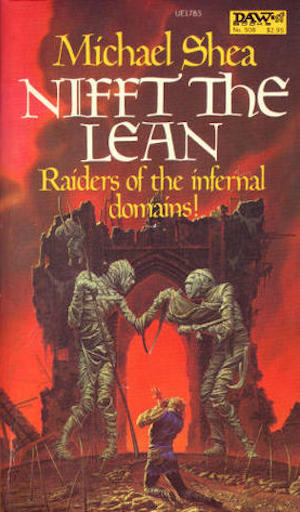
A novel that is really composed of four stories, this tells the story of master thief, Nifft, and the completely bizarre trouble he gets into. Unlike the others on this list, I read Nifft as an adult at the behest of Cassie Clare and two of her long-time friends who can all recite the entire poem “Something Unspeakable Followeth Me” from one of the sequels (spoiler: it’s a very large spider). You can see the influence of an even older classic, the Fafhrd and the Grey Mouser series, on Nifft, but Shea’s work is more violent, more strange, and more full of monsters. Like, at one point, a giant bee eats a guy’s head.
READ THIS IF: You are on a lot of psychedelics right now. Oh, or if you want to guess one of Cassandra Clare’s passwords.
Jack, the Giant Killer by Charles de Lint (1987)
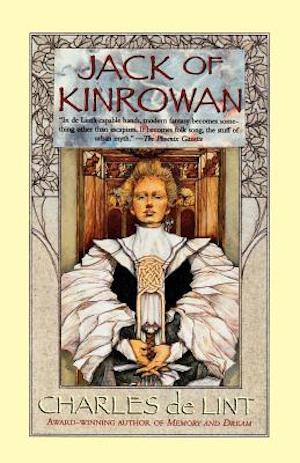
A contemporary retelling of Jack the Giant Killer starring Jackie Rowan, who gets drunk one night and is able to see between worlds, into Faerie. After spotting the Wild Hunt on motorcycles, she’s dragged into a conflict between the Seelie and the Unseelie Courts, one in which she emerges as Jack – a trickster figure who, with her friends, saves the day. This is one of the seminal urban fantasy classics by one of the people who created urban fantasy as we know it today. This was also one of the books that massively shaped my idea of Faerie in the modern world. When I met Charles and he said he’d read and liked my first book, I burst into tears. As opposed to so many of the other selections, this is a gentle book, one in which kindness matters as does making real connections.
READ THIS IF: You love faeries, cozy fantasy, or need an antidote after reading one of the other books on this list.
Shards of Honor / Cordelia’s Honor by Lois McMaster Bujold (1986)
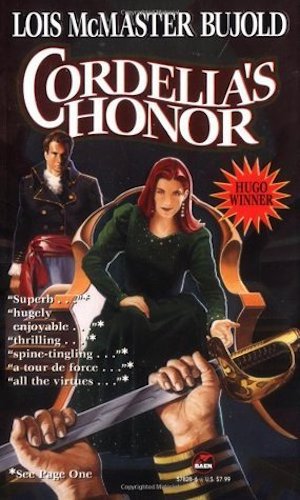
Cordelia Naismith, the Betan captain of a survey ship, winds up stuck on a planet with Captain Lord Aral Vorkosigan, the Barrayarean “Butcher of Komarr.” They have some excellent enemies-to-lovers energy – neither trust one another, and even after they do, he still maintains the artifice of taking her prisoner, while also asking for her hand in marriage. I read this packaged with its direct sequel Barrayar in a bind-up called Cordelia’s Honor and while Barrayar was published in 1991 and is therefore out of my self-imposed limit of 1990, you one-thousand percent want to read these together. It has one of the greatest bangers of an ending I’ve ever read. Also these lead directly into the much-beloved Miles Vorkosigan saga.
READ THIS IF: You watch space opera or play video games set on distant planets and wish there were more prickly, tense romances between badasses.
Nine Princes in Amber by Roger Zelazny (1970)
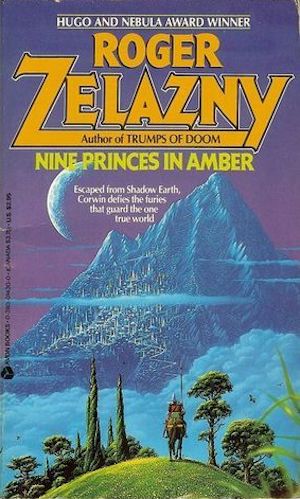
Waking up from a coma with amnesia, Prince Corwin struggles to remember who and what he is – one of the godlike heirs in competition to rule the throne of Amber, a “true” world of which Earth is only a shadow. There’s lots of delicious worldbuilding, some fun mixing of 70s slang and archaic speech, and devious swashbuckling to boot. This book was so widely and deeply beloved that one of my best friends even had a younger brother named Corwin, after the prince.
READ THIS IF: You loved Song of Ice and Fire and want some more family drama, this time across worlds.
Dragonflight by Anne McCaffrey (1968)

The first of the Dragonriders of Pern series features a feral girl named Lessa whose entire family was murdered by a guy named Fax before he took over the family Hold. She’s dreaming of revenge while using her telepathic abilities to help her stay hidden. She gets her chance when a few dragonriders arrive looking for a woman who can bond to (“impress”) a queen dragon while still in the shell. Though it has fantasy trappings, this meant to be a science fictional universe — the dragons are necessary to destroy the “thread” that comes from the sky and will otherwise turn the world barren, plus there’s time travel, which I absolutely will not explain. Lessa is able to use her powers to push F’lar into a duel with Fax – one that leads F’lar to kill him. But it also leads F’lar to realize what she did and drag her off to attempt to bond with the golden dragon that’s about to hatch. There is a lot of fun in the journey of a powerless, filthy, and conniving protagonist moving into a position of authority and despite the weirdness around dragon mating triggering sex between people, I have always loved Lessa for her sheer viciousness.
READ THIS IF: You love feral girl vengeance or enjoyed Fourth Wing and want some of the original bonded-to-dragon action.
Forgotten Beasts of Eld by Patricia McKillip (1974)
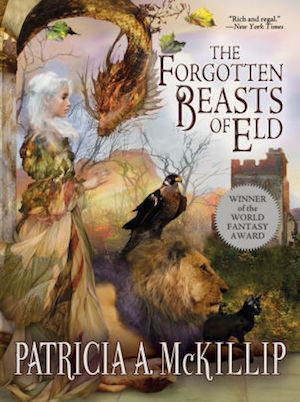
Lyrical and poignant, this is the story of Sybel who lives in the forest with a group of majestic and strange beasts (the huge black Cat Moriah, the blue-eyed falcon Ter, the gold-pelted Lyon Gules ,just to name three) collected by her sorcerous forbearers. She is cold and withdrawn, caring nothing for other people until she is given a baby to raise by Coren of Sirle. But when Tamlorn is taken from her, and she begins to understand the wages of power, she plans a revenge that will cost her heart. McKillip’s dream-like prose makes all of the emotions feel sharp, clear and true.
READ THIS IF: You’re here for the vibes, but also for ladies who make mistakes.











I love Pern with every fiber of my being, we would just need to…adjust…some aspects of the story. Like most of F’lar and Lessa’s relationship.
Anya Taylor-Joy as Sybel and…hmmmm, Alan Ritchson with merely human bulk and red hair as Coren?…would make a fantastic FBoE adaptation.
Not to mention Brekke and F’nor’s relationship in the next book. Some of the consent issues certainly haven’t aged well, but I still love those books; they were one of my golden age of sf books (ie, stuff you imprint on when you’re twelve). The world felt lived in and real, it was one of the early organized fandoms, and by all accounts McCaffrey was lovely with her fans.
I was thinking about McCaffrey’s work recently, and she had an interesting selection of prickly, non-maternal, career driven female protagonists, which was notable for that era. Characters like Lessa and Moreta in Pern were major planetary leaders, and their culture was set up so that fostering their children with more involved caretakers because of their career demands was normal. Killashandra was arrogant, sexually liberated, extremely ambitious and happily accepted sterility. The Rowan was demanding, powerful, intensely hard working, and while she wanted a big family, wasn’t the least maternal and her kids were fostered with relatives.
The Crystal Singer books could make an interesting adaption.
My memory of her at the 1969 StLouiscon was that she was “regal”. An impressive lady. But I also remember that she was gracious.
I read a lot of Pern stuff after that.
Love Pern!
Love Amber!
Love Elric (especially when you put him into the context of Moorcock’s larger universe where every hero is a manifestation of the Eternal Champion)!
CAT! My forever blorbo!
I have a go-to RZ but it’s not an Amber. It’s Doorways in the Sand, which is a perfect minor book. I was astonished to discover in 2015 that Doorways had been out of print for years and years and years. It has since been reprinted.
Well, there was a big mess in the estate then. (Write a will, people!)
Trent Zelazny was at Readercon the year Roger was their Ghost of Honor, and said about the estate “yes, I know, and no, I have nothing to do with that.” :-(
Il enjoyed Amber, but my intro to Zelazny was “Lord of Light”. (yeah, I kind of jumped right into the deep end.)
Although it seems as though every single character in it smokes, including the aliens. Zelazny really liked his tobacco.
I join James and mishaw in advocating for DOORWAYS IN THE SAND. A lovely book.
For Zelazney it’s also Lord of Light (one of my favorites!)
A book I have read way too many times, yet not enough
It may be impossible, but I’d love to see someone adapt A Night in the Lonesome October.
Perhaps a streaming series?
One of my favorite books in the world. One of those “I’d love to see an adaptation but am simultaneously terrified it would be ruined” books
Ah, memories of the attempted adaptation of Mort that ran aground on the filmmaker’s determination to remove Death from the final script….
Remove Death???
That sound you hear is me banging my head against the wall
I could not agree more, James. I have foisted my copy of Doorways on people to read for decades, second only to Pangborn’s Davy (which also belongs on this list, I think).
Reaching into the Way-Back Machine, I’m going to nominate works by a couple of largely-forgotten authors, both richly deserving of a rediscovery.
John Myers Myers gifted us both The Harp and the Blade (1941) and Silverlock (1949): absolute joys to read and rich material for broadcast!
Edgar Pangborn won the International Fantasy Award in 1955 for A Mirror For Observers, a beautifully humanist book that needs to be read in today’s world. Also, Davy (1964) kicks off the Darkening World tales with a bang and had great influence in the writing and music of the ’60s (“Wooden Ships” by Crosby, Kantner, and Stills, anyone?).
Silverlock is fantastic. I remember trying to find all the allusions pre-Internet. But I am not sure that it could be adated well.
Pangborn got increasingly pessimistic with age, so the effect of the Darkening Worlds as a whole depends on whether you read in publication order or by internal chronology. With publication order, the books are increasingly bleak. By internal chronology, things start off very very bad but end on a comparatively hopeful note, which is to say Davy’s time things are only bad.
I would also like to quote Mr. Peabody and mention the works of E.R. Eddison especially The Worm Ouroborous and it’s sequels
Loved the forgotten Beasts of Eld so much the cover fell off.
Another book that could use a revival is C. J. Cherryh’s Cyteen. Amazon thinks it is out of print, ISFDB’s most recent edition is 1995, and while current publisher Hachette lists it, the entry does not go so far as to include the cover art. Also, there has never been a legal ebook edition to my knowledge. It’s a mind-boggling situation for a Hugo-winning novel.
For those who are into furry conventions, etc (not all the species are furry, eg. the Kif), but some of the Chanur stuff could be kind of cool to see.
Then again, I’d love to see decent adaptations of just about ANY CJ Cherryh story.
Foreigner would also be great. You could run for so many seasons before you even had to think about worrying about getting ahead of the books!
I would adore a Pern adaptation that did enough of the grown-up stuff to establish the setting and then swung immediately into Menolly’s story. I got into college on an essay about Menolly.
The Forgotten Beasts of Eld is the reason I am a reader. Found it in a school library 4th or 5th grade. Thank you for mentioning it.
Catspaw, Amber, Elric, Dragonriders of Pern As an add, Blue Moon Rising by Simon Green
That entire series by Green is amazing.
Why does this article not have 50 comments yet? There are so many unjustly currently obscure former classics.
Well, since I can post replies but not regular comments, I’ll just drop this here:
Not sure how Shards of Honor / Barrayar qualify as fantasy – they’re clearly science fiction, with spaceships, interstellar war, technological exploration etc. Ditto the Pern books, though the dragons and regressed culture do fuzz it somewhat.
I would add: Barbara Hambly’s Time of the Dark and Sunhawk/Starwolf series, Gael Baudino’s Gossamer Axe, Katherine Kurtz’s Deryni books, and Judith Tarr’s Alamut duology.
I keep trying but it won’t let me post a comment with suggestions. Let’s see if a reply works better…
We’re all slackers, sir! (that, and it jsut made it to my inbox today…)
Because actually reading articles on the New! Improved! site is annoying, and logging in/commenting is worse?
Agreed!
Many of these are among my all time favorite fantasy novels, but there are some I have not read, and regarding those, I have got to say that you really know how to sell a book! Now, I have got to read tales from the flat earth, nift the lean, and swords point.
War for the Oaks- by Emma Bull
I second War for the Oaks, and also raise you Bonedance, one of Bull’s subsequent books, which is just as inspired. I just realized that all these books I love, Kushner’s, DeLint’s , Bull’s, Bujold’s and Vinge’s, came out over a 2 or 3 year span at the end of the Reagan era. Just bang, bang, bang. I’m not quite sure whether that says something, but but feels like it does.
A couple of the other books were written during Nixon’s or Bush’s presidencies. Bad presidents make for good fantasy?
Also Terri Windling, who created the urban fantasy shared world of Borderland at the same time. It’s no coincidence that Bull, Shetterly, Kushner, and de Lint are among the writers featured in those anthologies.
It would be interesting if they actually got an actor who resembled Prince to play the Phouka.
Emma, with her husband Will Shetterly, did adapt the book into a screenplay, and a short film/trailer was made.
James Branch Cabell – particularly The Silver Stallion.
I’ve read and enjoyed almost everything Charles de Lint has written, excepting his early short stories. His books and stories opened the door to urban fantasy for me, which was a brand new way for me to look at fantasy. Everyday magic, the old bleeding into the new. His Newford stories and books are also very excellent.
The Forgotten Beasts of Eld is a masterpiece, pure and simple and it rends my heart that it doesn’t get mentioned in the same breath as other greats like LotR or Earthsea.
Jack Vance’s Lyonesse trilogy.
“Night’s Master” and “Nine Princes in Amber.” Wow, those two books really impressed me when I was in high school/college. So glad to find someone else who likes them.
At least Lyonesse got a roleplaying game!
(astonishingly, not GURPS-derived but a BRP derivative)
As much as Barrayar was a relatively primitive world with archaic social structures, I never really got a “fantasy” vibe off any of the Vorkosiganverse books. At most, the Cordelia-stranded-on-Barrayar stuff is non-portal isekai with a very solidly SFnal protagonist.
There’s a very small number of telepaths later, but yeah, if you want fantasy from Bujold, there are two other options, both of which I’d also love to see although “iconic” might be exaggerating a bit.
Technically three,The Spirit Ring is a standalone historical fantasy unconnected to the Five Gods or Lakewalker settings.
So many of these!
The first Joan D. Vinge I read was Cats Paw. I didn’t realize there was a book before that and was very confused. I had picked it up from the library solely based on the cover.
I know the Pern books are problematic now, but as someone in an earlier comment said, they imprinted on me. I remember loving the fact that the heroine wasn’t likeable at all. And she never became likeable. Although Anne Mccaffrey would say these books are science fiction and not fantasy.
Moonheart, Spiritwalk, and The Little Country were my favorite Charles de Lint books. I’ve read them so many times the covers have come off. Although I like the Newford books, something about those older works had so much magic for me.
I don’t know if Guy Gavriel Kay needs to be rediscovered, but I love Tigana and never see it mentioned.
Lastly, Diana Paxson. The White Raven and The Serpent’s Tooth.
I would love to see an adaptation of Tigana even though I would sob unceasingly for the last one-third to one-half.
Joy Chant’s Vandarei novels may be ripe for some form of adaptation. The first, Red Moon and Black Mountain, is reminiscent of the Narnia stories and was doubtless influenced by them, with the twist being the time dilation aspect that has one of the protagonists going back years before his siblings so that he goes and grows up native among the horse people. The Grey Mane of Morning and When Voiha Wakes are more straightforward. The first does a deeper dive into the nomadic culture we first see in Red Moon, while the other seems to be placed much farther back in the world’s history.
I am always boggled to see how few books Chant wrote but not as much as the fact her books seem to have been out of print for 40 years.
Was the post supposed to be about “fantasy”? Because, er, Cat’s Paw and the Vorkosigan books aren’t fantasy. (And the Vorkosigan books and the Amber books don’t seem quite forgotten.) That said, a nice list of books.
I’ll suggest Avram Davidson’s The Phoenix and the Mirror for now.
And much as I love Davy, I don’t really see it as fantasy.
I have to say that I emphatically approve of the Elric recommendation. The biggest shame is that it’s so darn hard to find books by Moorcock, even the recent ones (when his latest Elric book came out, the B&N near me only had ONE copy!).
I have practically every book that that man has ever written (and some written within his multiverse by other people. I’m looking at you, Tad Williams), and some of them are even signed.
I’m still trying to decide if I want to learn French so I can justify buying a copy of Elric et la Porte des Mondes.
I want to see Vorkosigan books as an anime in a sort of 70’s Leiji Matsumoto mode.
The Dragon Waiting by John M. “Mike” Ford.
If you’ve read it, you know why I’m recommending it.
If you haven’t, you are missing the finest novel of the last half of the 20th century by a master of the genre.
Hear, hear!
Please can we have an adaptation of ‘The Weirdstone of Brisingamen’ and ‘The Moon of Gomrath’, prefereably while Alan Garner is still around to advise and enjoy tem?
Lin Carter never did a better day’s work than when he retitled The Virgin and The Swine and published it as The Island of the Mighty. I’ve pushed battered pb copies of Evangeline Walton’s Mabinogion tetrology into so many hands (in fact I need to look for a new set – I gave my last one away!)
Lin Carter also gave us Thongor the Meathead. “You can look at marks on paper and understand? Die, foul wizard!”
What has happened to Zealand he should be present in movies and tv?
Sorry Zelazny
Does alt hist with mysterious magic count as fantasy? Because PAVANE by Keith Roberts (1968) belongs on this list if so. I still have my treasured yellowed beat up dimestore copy. Absolutely memorable and marvelous.
My go to books when sick are the River of the Dancing Gods books by Jack Chalker. He’s gone too soon but left a great series.
When I was a tween back in the 1970s, I wrote to John Christopher asking that his series that begins with The Prince in Waiting be made into a movie. He wrote back and was in full agreement, of course, but it wasn’t his call.
I stand by that letter still. The Prince in Waiting is a great fantasy about a disaffected prince dealing with the strictures of his society that, by the third book, turns into a post-apocalyptic SF tale.
This is a fantastic list, many of my own picks are on it (seriously, no Elric yet? really?). Would love to see Glen Cook’s Black Company, Steven Brust’s Taltos, Mary Gentle’s Ash series, Jack Vance’s Dying Earth, Fritz Leiber’s Fahfhrd and Grey Mouser as adaptations. A proper, firmly Robert E. Howard based Conan series as well. There’s so many really…
Perhaps even more problematic that the Pern books, given the author’s disreputable private life, yet I was a big fan of the Darkover novels as a kid.
Yeah, but she loved her fans doing fanfic based on Cottman IV. Think she even had some of them (with authors’ permissions) published. I was a fan of them in a previous life, too.
For some “adult” fare (wonder how to adapt them?) LeGuin’s “Left Hand of Darkness” (or the short “Winter’s King”). She was an amazing writer.
The Face in the Frost, by John Bellairs. He was known for quiet small-town YA work; this (IIRC his only adult novel) was unique at the time (1969): quirky, funny in places, dark in others, a story of two wizards who get a problem dropped on them and have to cope with it somehow despite relatively modest powers. A standout from when wizards were mysterious, powerful figures.
I adore Tanith Lee and just got finished reading the Tales from Flat Earth for the first time! I would love to see it adapted as a really intricately animated series. I think it would be so cool if each of the smaller vignettes where in a slightly different style to show the progression of time in flat earth (sighs)
You may want to keep an eye out for Storyteller: A Tanith Lee Tribute Anthology.
I also cut my spec-fic teeth on McCaffrey! I must say my favorite McKillip from the 80’s was The Changeling Sea, and I’m surprised nobody has mentioned Barbara Hambly. Dragonsbane has pride of place on my vintage fantasy shelf.
Also from the 80’s and more accessible for my younger self’s friends were the absolute WONK of slim fantasy paperbacks by Craig Shaw Gardner and Simon Hawke. Any those would be great to adapt to the small screen!
As long as we’re going way back, how about E.E. “Doc” Smith? Let’s adjust the treatment of women, for sure, but Lensmen was a fun series, and the basis of the Green Lantern Corps.
The Lensman series was better for treatment of women than the Skylark series. I am more concerned in Lensman about the eugenics. And the Arisians who told everyone that no one can lie when talking mind-to-mind. And you could believe them because they were telling you mind-to-mind. Then lying their incorporeal donkeys off. Space opera Aes Sedai!
Steven J Wright just did a great post on fascist-like thought in SFF, which about half-way through goes DEEP into the Lensmen books. I recommend it highly for the way it teases out some of the eugenic and authoritarian ideas embedded in the novels.
I enjoyed the Lensmen books a great deal when I was twelve, but Wright has convinced me that the Suck Fairy has visited them.
I’d always slot in Patrick Tilley’s Amtrak Wars sequence by dint of it being very much forgotten, bonkers, a lot of fun (despite some 1980s-isms) and a very original genre-mashup of epic fantasy, 1980s Americana, post-apocalyptic science fiction and, just for giggles, Shogun. I was always fond of Tilley depicting North America free of from modern civilisation basically as a fantasy landscape on a par with Middle-earth. Quite striking.
A refreshing set of suggestions. Several of which I have read. Sadly the Shea is out of print.
I’d also love to see C.J. Cherryh getting more attention — the Morgaine books or maybe Downbelow Station and some other Alliance/Union stories. Or even the Chanur books, although that might be a bridge too far.
And my other dream is Michael Reaves’ Shattered World/Burning Realm getting rediscovered.
Oh! And especially in light of the new Shogun series on Hulu, I covet an adaptation of Raymond Feist & Janny Wurts’ Empire trilogy.
Elric is most excellent! I had thengood fortune to work with Michael Moorcock as editor of the latest Elric story, which can be found in the first issue of New Edge Sword & Sorcery magazine: https://newedgeswordandsorcery.com/product/new-edge-sword-sorcery-issue-1-digital/
Excellent selections, but Nyfft the Lean is the continuation of a Jack Vance–created character.
As far as Tanith Lee, while the Flat Earth books are in my top five favorite series of all time, I’m not sure if they’re the ones I’d choose to adapt — so much of the attraction is her language. If I was going to pitch Tanith Lee to HBO or Netflix or whomever, I’d probably lean towards something more like the Birthgrave or Storm Lord trilogies, or maybe the Secret Books of Paradys.
Have to put in a pitch here for Kristen Britain’s “Green Rider”
Triplanetary by E E Smith – Classic (and original) space opera. Followed by First Lensman and the rest of the Lensman series. First Lensman has the most outrageous first page I have ever seen.
I am mighty glad that Anne McCaffrey’s _Dragonriders of Pern_ series is on this list (first fantasy series I liked) but I’m also disappointed that Robert Asprin’s _Myth Adventures_ series was not on the list. Until I discovered his series, I didn’t think fantasy could be funny or be something where I looked forward to the next volume. Fantasy novels taking themselves way too seriously felt very snooty and othering to me. I also got tired of the World building info dumps at the beginning of many novels
If you’re interested, you can read an appreciation of Asprin and Myth Adventures here: https://reactormag.com/looking-for-your-next-favorite-writer-dont-myth-out-on-robert-asprin/
Love both the first and second volumes of Zelazny’s Amber.
And much much love for Patricia McKillip’s Riddle Master of Hed series.
Swordspoint is still one of my all-time favorites and rereads.